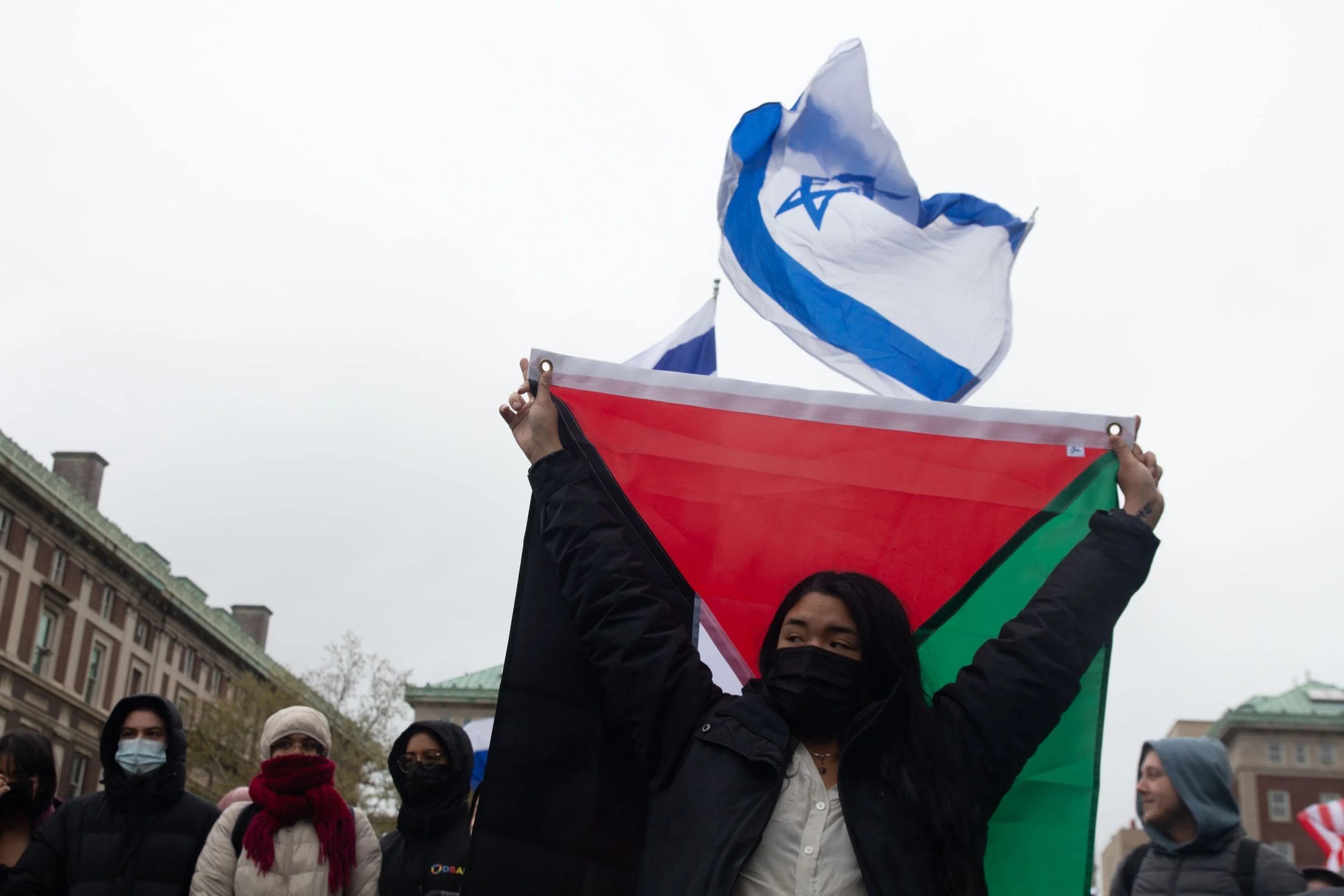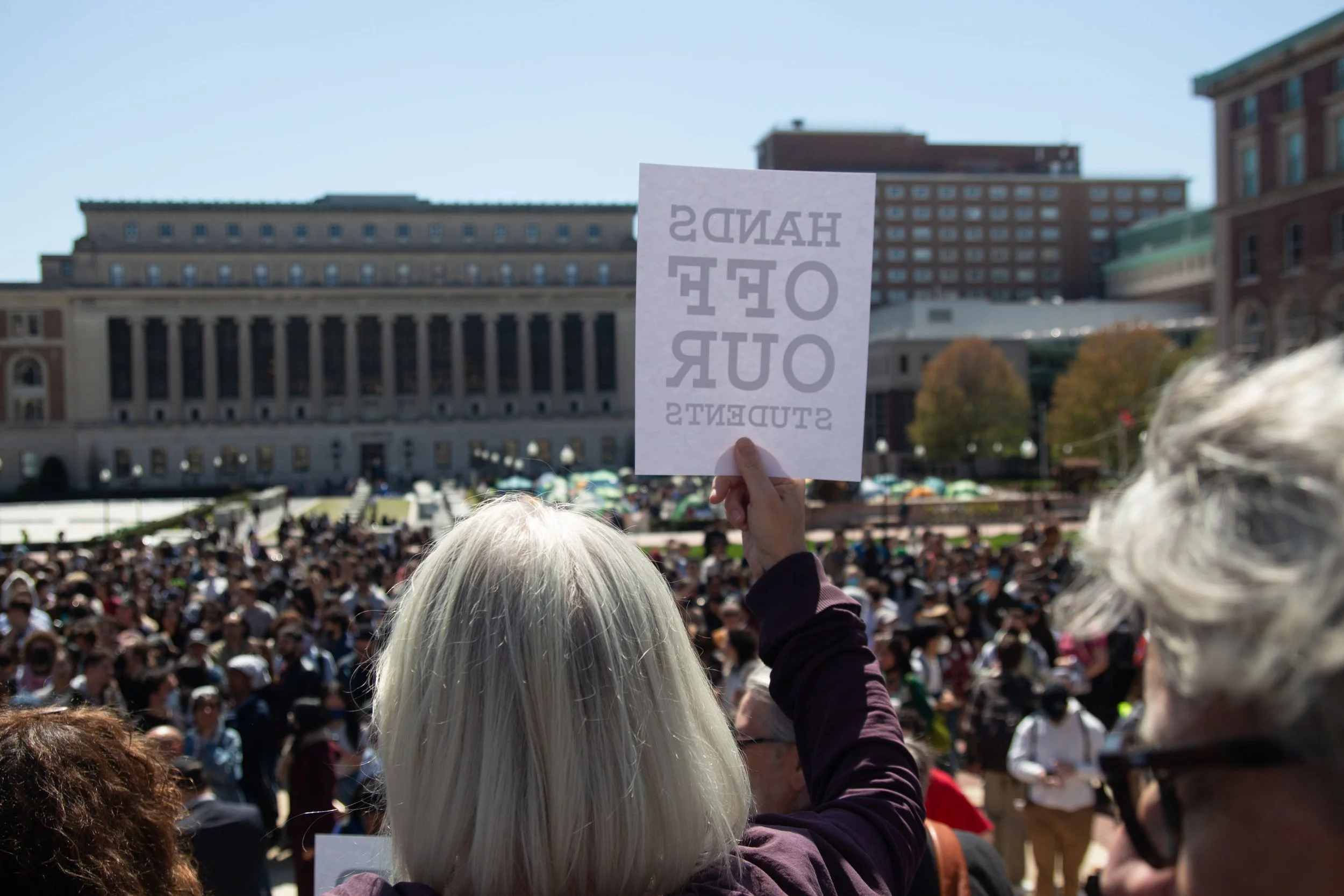'Fuck You' We Are Not Leaving
The following was published in our encampment edition. Support our publication by downloading the edition, ordering a print copy or becoming a subscriber today!
I was fighting off a small cold that week, the kind that makes your throat feel extra dry and eventually tickles you into coughing a handful of times. There was nothing serious to it, just a vague discomfort that felt exacerbated by sleeping—or not really sleeping—in a tent on the quad of the university I graduated from years ago. The ground was hard, and there was no reason to assume I would be there long, so I didn’t use an air mattress. We had a blanket lying on the floor for a pathetic layer of cushion. One of those days, I lay awake at four in the morning, unable to fall into a stable sleep. I finally drifted off, then I heard the Athan.
Early in the morning, the sun shone lightly through the tent, and people in the encampment settled in for the day. All I could hear were birds chirping and an occasional car whizzing by on Fullerton Avenue. I was quite familiar with that place. I lived many important moments there. Years before I slept under that tree, I studied under it. It could have been the virus my body was keeping at bay or just the fact that I wasn’t sleeping where I normally did, but what really kept me up was the reason I was there in the first place. I was kept awake by the fact that the world finally felt like it was turning upside down—the only normal response to the horror we’d all witnessed. At the time of this encampment, we were marking six months since the genocide began. Now, it’s been over a year and a half.
Back then, I wrote about the collective responsibility we have simply because we are alive in this moment of history. I also wrote about losing my mother. My mom represents my most personal experience with grief, and she is also the person that taught me how to camp. There was a lot of grief at the DePaul encampment, and my camping skills failed to stick around into my 20s. We could speculate on whether or not my mom would be proud of me for trying my best to be a small thorn in the side of power, but I know she was rolling in her grave when I struggled to pitch a tent.
At many university encampments around the United States, students put up free libraries named after Refaat Alareer, the Palestinian professor, writer, and poet who was killed by Israel on Dec. 6, 2023. I remember exactly what I was doing when Alareer died. I was walking from the grocery store to my dad’s house in California, and my friend told me the news over the phone. It feels like decades ago now. Alareer was insanely funny. I thought about him a lot at the encampment because he loved Chicago and deep-dish pizza, and because a lot of my professors stopped by the encampment to support us. I couldn’t fathom losing them like Alareer’s students lost him. My professors taught me to ask the right questions about the world and guided me into a more meaningful life where I can appreciate what’s in front of me. But what happens when they’re all gone? Every university in Gaza was destroyed, and thousands of educators have been killed in cold blood. In the West Bank, Palestinian students get thrown in arbitrary military detention for organizing. It doesn’t really matter that we had trouble sleeping outside during the encampments. It just mattered that we were there.
The week before the encampment launched at DePaul, Israel killed Alareer’s oldest daughter and newborn grandchild. At that point, the confirmed death toll was around 40,000. Those are 40,000 stories exactly like Alareer’s, reminding us of why we were there.
Eventually, Zionists arrived at the encampment and told us we were the baby killers and terrorists. Their words don’t sting anymore. Bisan Owda, a beloved journalist in Gaza, said the encampments gave her hope for the first time in her entire life. I couldn’t possibly care what a Zionist thinks about me.
When left alone, our encampment was a great microcosm of the world I want to live in one day. People took care of each other. We provided for each other. We shared stories and fed one another. All of that, though, is a byproduct of our greater political purpose. Collectively, our university endowments invest billions of dollars into the genocidal Israeli regime. The chants about universities funding the slaughter of Palestinians aren’t just slogans; it’s our political reality. Presidents and boards of directors are insisting that divestment is impossible, and they may be right. Some of our institutions invested so thoroughly into violence that they will collapse if they stop doing so. Our politicians and institutions made war and genocide the investments with the highest returns, and now they’re starting to feel the sting of the fire they started. But the masses don’t have investments or returns—just back-breaking debt and their dignity. The further they push us down this road, the more people they are creating with nothing left to lose and the entire world to demand.
In recent months, Mahmoud Khalil and dozens of other students and graduates in the U.S. were detained and are facing deportation for their belief in human dignity. A state only gets this repressive and totalitarian when it’s on the verge of collapse. As people who stand against genocide take to the streets in defense of Khalil and the Palestinian people, I find myself thinking of Alareer again, who when Israel announced the evacuation orders of Gaza City said, “Fuck you. We are not leaving.”




